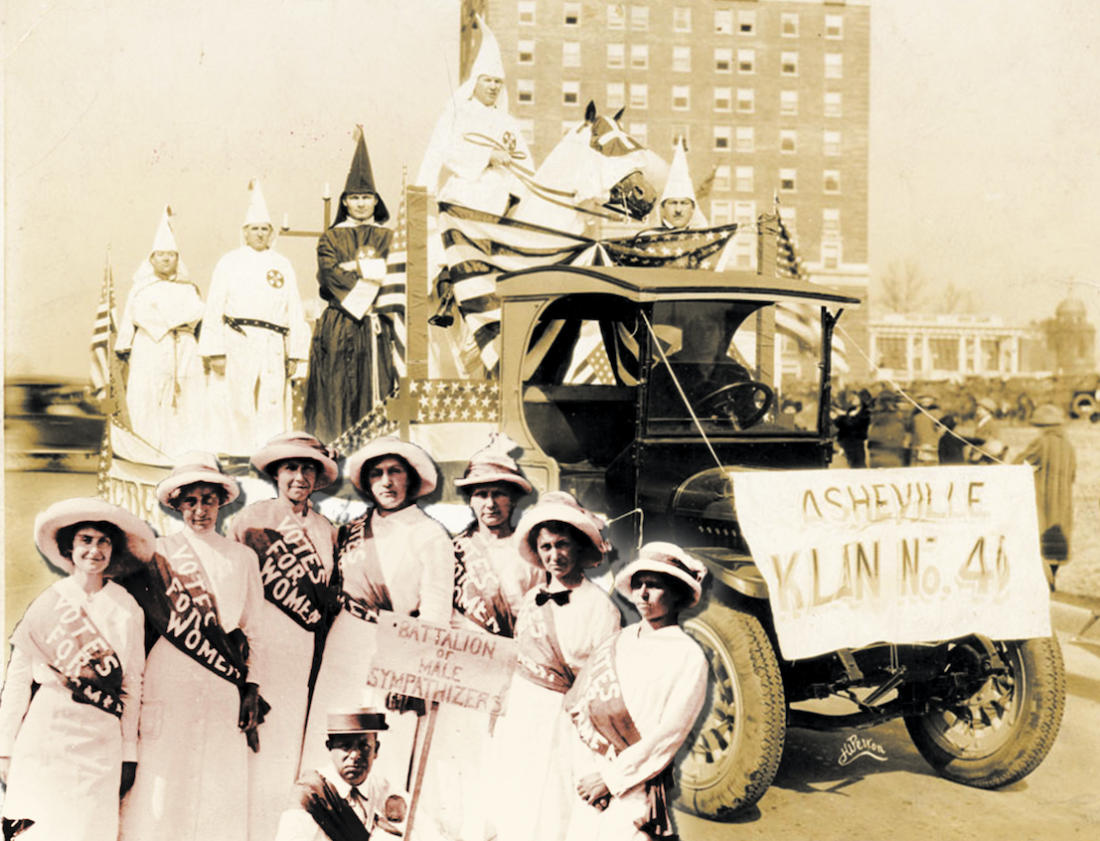In early August 1920, the United States was on the verge of historic change. At the time, 35 states had ratified the 19th Amendment; one additional state was needed to earn women the right to vote across the land. North Carolina was among the remaining 13 states yet to join the majority in approving the measure.
For one Asheville resident, resistance was an appropriate stance. In an Aug. 14, 1920, letter to the editor, a Charles H. Neal told The Asheville Citizen he disapproved of the amendment not because he was opposed to women’s rights, but rather because he saw it as a threat to white supremacy.
“Dear women of North Carolina, the men of the south have gone through fire and blood to protect you against domination by an inferior race of people,” Neal wrote.
The letter writer went on to quote from N.C. Gov. Thomas Bickett’s Aug. 12 address to the state legislature. Ignoring Bickett’s call to accept “the inevitable” passage of the 19th Amendment, Neal highlighted one of the governor’s lingering concerns about the women’s movement — the Black vote. “I greatly fear that woman suffrage would reopen these old questions and force us to fight again the battle for a white government,” Bickett declared.
Two days later, on Aug. 16, 1920, Elizabeth Earl Jones, chairman of the Special Committee of the Asheville Woman Suffrage League, responded to Neal’s claims in her own letter to the editor. An unapologetic white suprematist herself, Jones did not refute Neal’s racist ideology. Instead, she challenged the notion that women’s suffrage would apply to all races.
Like Neal, Jones backed her assertions with the words of a powerful figure — North Carolina U.S. Senator Furnifold Simmons. “If this amendment should be ratified, the North Carolina constitutional amendment of 1900 would operate to disfranchise negro women to the same extent, and in the same way, as it now disfranchises negro men,” Simmons told The Associated Press in an Aug. 13, 1920, article published in The Asheville Citizen. “The education tests of this amendment have for 20 years effectually eliminated negro men from politics in North Carolina. Why should negro women, if enfranchised and subject to the same tests, fare better?” (For more on the 1900 amendment, see “Asheville Archives: “‘White Supremacy Made Permanent,’ 1900,” February 6, 2018, Xpress)
Along with the senator’s remarks, Jones offered her own bigoted reassurances to the paper’s white male readers:
“To all who have fought and suffered for white supremacy in the south, let me say, the white women appreciate your protecting arm, and we want to stand beside you and be allowed to do our part so as to doubly insure the safety of our homes, our institutions, and the purity of our politics (which, by the way, need some insuring.)”
Her letter’s final point, however, called to mind the American Revolution — namely, taxation without representation. Though Jones refrains from promulgating further racist ideology within these remarks, her words reveal the implicit view that the work and concerns of Black Americans did not necessitate similar considerations that white women such as herself were now insisting upon. Jones writes:
“Since anti-bellum days circumstances have forced the women of the south in very many instances to enter the business world, to compete with voting business men, in order to earn a living, and often to help support our families. We have to labor and pay taxes, and yet we have no actual voice in the conditions under which we must labor. Worse still, we have no actual voice in the government which vitally affects the welfare and even the lives of our loved ones. We have no actual voice in upholding our national honor and yet we feel its obligations as keenly, and sometimes more keenly, than do our men.”
On Aug. 18, 1920, Tennessee became the 36th state to ratify the 19th Amendment. On Aug. 26, it was signed into law. Yet for decades, poll taxes, literacy tests and violence continued to conspire to keep the majority of women and men of color from exercising their right to vote. And though white women across the nation were eligible to partake in democracy, the General Assembly of North Carolina did not endorse the amendment until 1971.
Editor’s note: Peculiarities of spelling and punctuation are preserved from the original documents.






Before you comment
The comments section is here to provide a platform for civil dialogue on the issues we face together as a local community. Xpress is committed to offering this platform for all voices, but when the tone of the discussion gets nasty or strays off topic, we believe many people choose not to participate. Xpress editors are determined to moderate comments to ensure a constructive interchange is maintained. All comments judged not to be in keeping with the spirit of civil discourse will be removed and repeat violators will be banned. See here for our terms of service. Thank you for being part of this effort to promote respectful discussion.